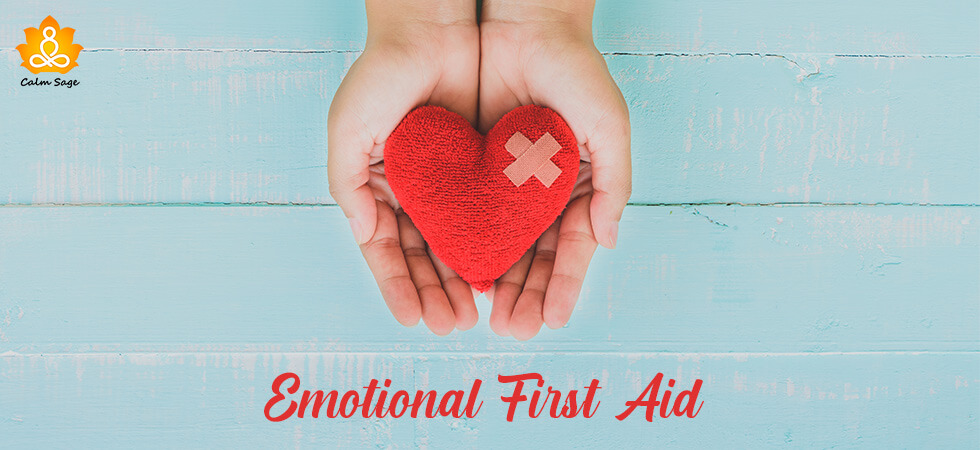5 Ways to Practice Emotional First-aid

What is the first thing you do when you crack a bone or begin to bleed? Run to get first aid, right! Then why do we not do the same thing when we go through emotional hurt and pain?
Even a 5 year old knows that he will need first-aid if he is hurt. That’s the level of awareness we have for physical first aid. We need that kind of awareness for emotional first aid too.
So many times I have heard people say, “It’s all in your head. Stop thinking about it!” Do you ever tell someone with a broken leg that it’s all in the head? No, you don’t. It’s high time we start learning emotional first aid just like we learned physical first aid. Both are equally important.
The first step towards learning emotional first aid is to gain proper information about it. Dr. Guy Winch, a psychologist, and author of Emotion first aid, has explained it beautifully. Let’s give a look at his recommendations…
Also Read: Emotional Wellness: Ways To Improve Your Emotional Health
5 Ways to Practice Emotional First Aid
1. Recognize Your Emotional Pain.
Just like our physical injury shows signs of pain and suffering, our emotional injury does the same too. Emotional pain will not go away by simply ignoring it. It needs attention and care too just like your physical wound.
In case of failure or loss of a loved one, you are emotionally hurt and there’s a lot of emotional pain which needs to be recognized and taken care of. Talk to your friends and family when you are in pain. You can even try writing your feelings in a diary.
Only by recognizing the pain can you try to work towards reducing it. No wound heals without treatment be it physical or emotional. Hence, always keep a check on your emotions. Do not ignore them!
2. Be compassionate & gentle with yourself.
We should all be compassionate about ourselves. Self-deprecating thoughts will only bring us down. Statements like, “I am not good enough” or “I can never be happy” will just harm your self-esteem.
Whenever you begin to get such negative thoughts, try to substitute them with positive ones. I understand that we can’t always feel positive. And in such situations we should remind ourselves that it’s okay to make mistakes.
Nobody is perfect and we can’t be either. Just try to be a better version of yourself and that’s all that matters.
3. Avoid ruminating emotional pain.
When you can’t laugh over the same joke again and again, why cry over the same pain again and again? Thinking about your emotional wound time and again is only going to worsen the condition.
If you are guilty of doing that, stop right away. It’s like digging a cut even deeper. I know it’s not easy to completely forget about emotional pain. What you can do is distract yourself from the pain arousing thoughts, even though it’s temporary.
Try to get involved in things that require a lot of concentration. Indulge is a practice that helps you let go of the pain, you could join a support group.
Also Read: The Role of Social Support for Health and Wellbeing
5. Redefine failure.
We all set certain goals for ourselves. We achieve some and fail at achieving others. You should not define yourself according to your failures. You are not your mistakes and shortcomings.
Also Read: Why Do I Feel Like Failure? (What Should I Do About It)
Failure is part and parcel of life and we should keep it that way. Learn to accept yourself. Own your flaws and shine through them. Avoid being overly critical about yourself. Failing at some is not the end of the world.
Learn to give yourself a chance. Failure is the stepping stone to success, so appreciate failure also. Don’t beat yourself up for something that’s inevitable.
6. Reframe Meaning of loss.
Loss doesn’t always mean losing a loved one. You can also experience loss of job, house, a friend, etc. The basic feeling involved in loss remains the same in all such situations. We all have dealt with loss at some point in our life.
Some struggle hard and some manage to sail through it. What’s gone is gone for good, can’t have it back. What you can get back is your mental peace. Try to find meaning in loss.
Try to find out what you have learned from this experience. Reframe your thoughts about the loss. Everything happens for a reason and this may have happened for the same too.
Also read: How To Cope With Job Loss Stress During Coronavirus Pandemic?
Psychological pain is as real as physical pain. Shouldn’t ignore either of them! There will be times when you won’t even realize that you are going through emotional pain. Remember the time when you felt numb? That numbness is emotional pain.
Like I said before, keep a check on your and your friends/family’s emotional wellbeing. These emotional first aid tips can help all of us stop further damage to our emotional wounds. Keep these 5 points in mind so that you can always help yourself and others.
In today’s times, emotional first aid should be practiced in every home, friend circle, school, and workplace.
I hope you make use of this emotional first aid kit in your life to improve the quality of your emotional health.
Do share the blog with your friends and family so that they can learn to practice emotional first aid too. Also let me know what you would like to carry in your emotional first aid kit, in the comment section below.
Thank you for reading!
Take care! Stay safe!
Next Read:
List Of 10 Basic Emotional Needs In A Relationship & Their Importance
What Are The Signs Of Emotional Invalidation & How To Deal With Invalidation




















